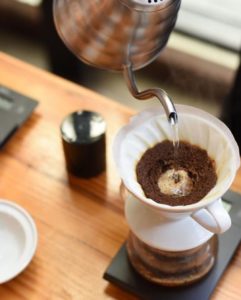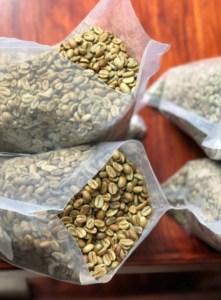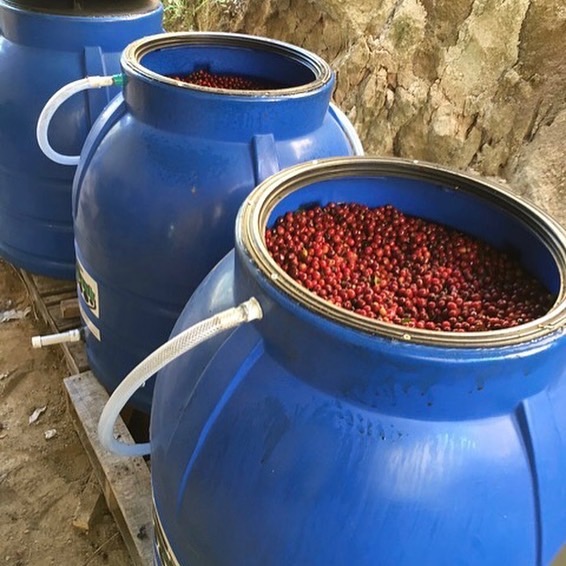I’m about to try a $100 cup of coffee, but it doesn’t feel like I’ve earned it. Coffee is usually functional to me. If I could get it every morning from my mechanic’s shop, I would. I like dark roasted beans — things that taste like chocolate.
Most Americans add cream and sugar to their morning brew because truly everyone just wants to drink a cake first thing in the morning. I’m not different. Give me cinnamon, whipped cream, and Butterfinger bits like it’s a DQ Blizzard — I don’t care. In summation, my palate for coffee is dull, basic and untrained. I have no business tasting the Elida Geisha 1029, but here we are. Sitting in front of me is the most decorated and accomplished coffee on earth, but how did it get here?

Courtesy Klatch Coffee
At the 23rd Best of Panama competition, the Lamastus family’s Elida estate produced a record-breaking Geisha coffee. If you’re not a coffee aficionado, there’s a lot to unpack there. Geisha is a type of coffee, like merlot is a type of wine, that originated in Ethiopia and eventually made its way to Panama. It is described as light, fruity and deeply flavorful.
This world record quality coffee is made possible through the Elida estate, owned by Wilford Lamastus. The Elida estate is located in the Volcan Baru national park in Boquete, Panama. Elida coffee is grown between 5,500 and 6,000 feet above sea level, or about the height of Mt. Washington. All of these unique circumstances allow the Elida estate to excel in growing the very particular type of Geisha. The conditions in which the Elida Geisha are grown and harvested are remarkable. The climate, the process, the deep dedication of Wilford Lamastus — these circumstances are why the Elida Geisha 1029 is so rare and expensive.

Elida Geisha 1029 beans (Courtesy Klatch Coffee)
I acquired this coffee through Klatch coffee roasters, who mailed me a slick little box that looks like it contains some trendy new phone or gadget. Klatch, as their website says, “has been serving up award winning coffee for over 25 years.” I open it, and the first thing I see is a little dime bag full of ground coffee beans. There are no instructions, and for a brief moment I think, “Do I snort this?” This isn’t just any coffee, mind you – this is premium dust. This is the Elida Geisha Natural 1029, the winner of the most prestigious coffee festival in the world, and the taste is a little jarring.
For the non-coffee heads — the Elida Geisha 1029 will be a little sour. It is bitter and faintly fruity. It’s complex, too. If you’re accustomed to Starbucks, and their deeply familiar name brand flavors, this might not be for you. My palate isn’t trained to accept the nuanced, light roasted flavors of highly rated coffee.
The barista at Loupiotte, who is French, tells me that he doesn’t understand why Americans like dark roasted coffee so much. Am I too dumb to enjoy good coffee? That thought crosses my mind, and there is a lot of evidence to suggest that. By the end of the cup, it starts to grow on me. Maybe coffee should taste like this. Certainly, we Americans are guilty of a fatal sweet tooth, but I could see myself getting used to this. The buzz from the cup was also delightful, and didn’t induce one of those terrible coffee hangovers you get from a cup of Folgers. There was no hard caffeine crash; no sugar nap to be had later in the day. I drank the Elida Geisha 1029, and just kept going. Light, fruity, and earthy — this coffee does feel good for you.

Elida Geisha 1029 (Courtesy Klatch Coffee)
If you’re a coffee geek, then spending a $100 on a cup of world record coffee is like a vacation for you. You should absolutely splurge, and if you have a loved one that’s got the refined palate for such an esteemed brew, it makes a good Christmas gift. Buying someone a $100 cup of coffee? That at least nets you a favor.
Klatch Roasting, with a store in Redondo Beach, is one of only two coffee shops in the United States that has a supply of the rare coffee which they are selling for $100 per cup through a series of ticketed events.
Advertising disclosure: We may receive compensation for some of the links in our stories. Thank you for supporting LA Weekly and our advertisers.

